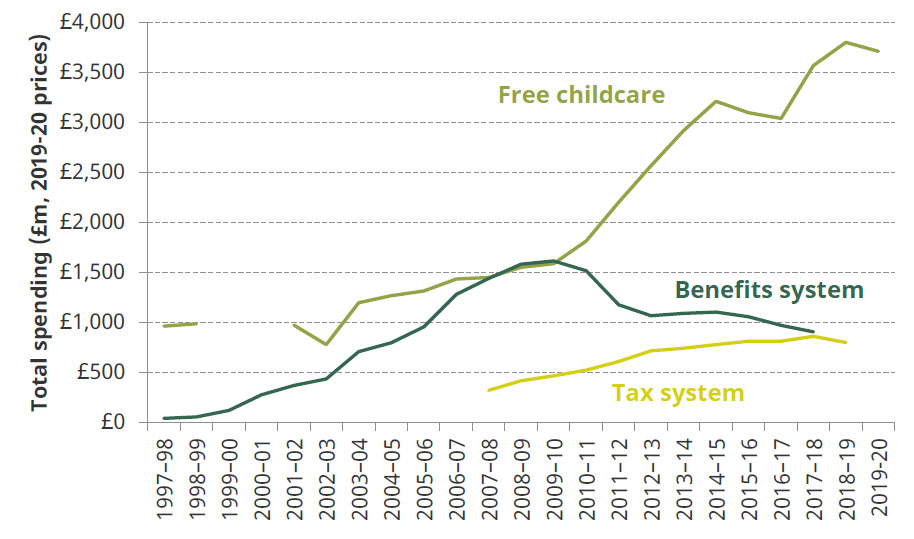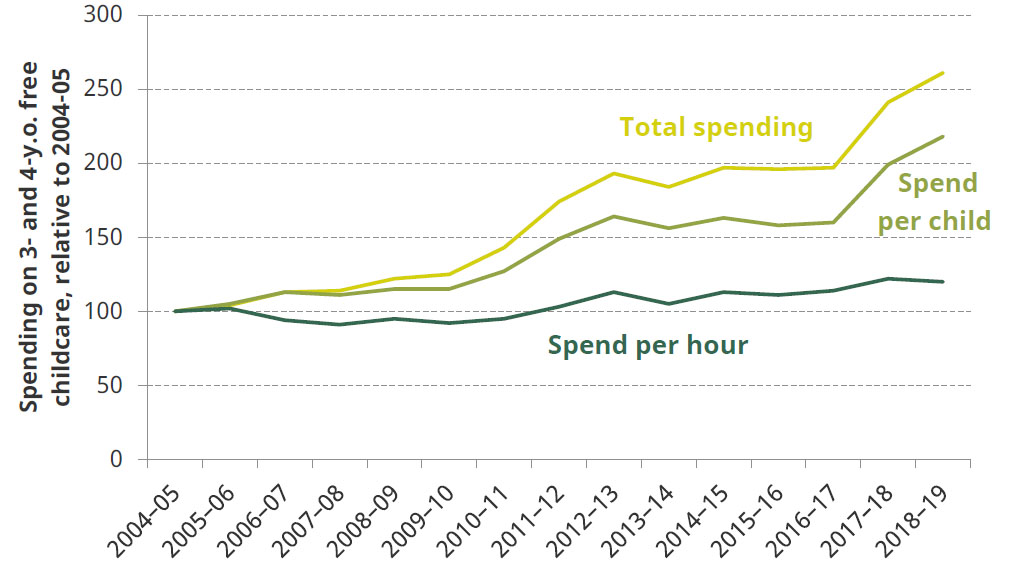The early years has been one of the fastest-growing areas of education spending in England. Our recent report on education spending found that spending on early years education and childcare has grown from almost nothing in the early 1990s to stand at £5.4 billion in England last year.
This money is channelled through three types of programme, including:
- free early education and childcare for all three- and four-year-olds (and disadvantaged two-year-olds;
- tax relief programmes for childcare, such as tax-free childcare and childcare vouchers;
- and support for the childcare expenses of low-income benefit recipients.
Figure 1 summarises how spending on these different programmes has changed over time. Since 1997, successive governments have significantly increased spending on free childcare hours; total spending in this area is now about £3.7 billion. Even more notably, spending has risen by more than 130% over the last decade, a time when many other areas of education and public spending more broadly were being squeezed. Spending on free childcare for 3- and 4-year-olds has more than doubled since 2009–10, equivalent to a rise of almost £1,900 in annual spending per child after inflation.
As Figure 2 shows, higher levels of spending are almost entirely explained by a more generous entitlement (with more hours of free childcare for more children). Most recently, the government extended the entitlement to 30 free hours for children whose parents are in work. Spending per hour has remained relatively flat for most of the last 15 years, with a 7% uptick in 2017–18.
Figure 1 also shows how spending on childcare subsidies through the tax and benefit systems have changed. While spending on childcare for low-income working families through the benefits system grew quickly during the 2000s, it has been cut by almost 45% since 2009–10. On the other hand, spending through tax relief programmes like childcare vouchers and tax-free childcare is up 85% since then, and in 2017–18 was nearly as high as spending through the benefit system.
On top of this spending on childcare and early education, the government also funds other programmes to support children and their families in the early years. One of the biggest of these is Sure Start children’s centres. Sure Start spending, which peaked at £1.6 billion in 2010–11, fell by almost two thirds to £600 million in 2017–18 (the last year for which out-turn data are available). Over this period, it has fallen from more than 40% of the level of total childcare subsidy spending to just 11%.
Both the amount of spending on the early years and the design of the policies it funds are important. The early years are a crucial driver of the outcomes of children and their parents: childcare has a role in helping parents – especially mothers – to combine working with raising a family. Early years education can also help children to become ready for school, which in turn shapes their ability to reach their potential in education and later life. And the early years could help address inequalities, such as the gender pay gap and the gap in school achievement between children from disadvantaged and better-off families.
Figure 1. Spending on different types of early education and childcare support

Figure 2. Spending on free childcare for 3- and 4-year-olds, relative to 2004–05

Useful resources
Election 2019 analysis
Universal free school meals are back on the table
In their manifestos, both the Labour party and the Liberal Democrats have promised to extend free school meals to more children. The Labour party would introduce free school meals for all children in primary schools, while the Liberal Democrats would offer them to all secondary-school pupils whose families are receiving universal credit as well. Meanwhile, in their manifesto the Conservative party promises to “maintain our commitment” to free school meals – which we interpret as a plan to keep policy as it is.
Find out more >>>
The Liberal Democrats’ plan for childcare would mean a big expansion in the welfare state
The Liberal Democrats’ manifesto puts childcare front and centre. The party is promising to spend – on its own costing - £13 billion on free childcare in 2024 (plus another £1 billion on Sure Start children’s centres). That’s almost £12 billion of free childcare spending in today’s prices – and a far sight more than the £3.7 billion we spend on free childcare in England today.
Find out more >>>
Proposals for the early years in England
Support for childcare and the early years is shaping up to be a major issue in this election campaign. To date, both the Labour party and the Liberal Democrats have promised enormous increases in the generosity of England’s free childcare system, with money for extra funding per hour, extra children, extra hours and – in the Liberal Democrats’ case – extra weeks of the year.
Find out more >>>
Early education and childcare spending
Early education and childcare has also become an increasingly important part of the education spending landscape. Between 2009–10 and 2018–19, annual spending on free childcare for 3- and 4-year-olds rose by almost £1,900 per child (in today’s prices) and we spent £3.3 billion last year on providing these free places.
Find out more >>>
Social media
Background analysis
Briefing note
Does free childcare help parents work?
Proposals for the early years in England
Report
2019 annual report on education spending in England
The health effects of Sure Start
Report summary
The impact of free early education for 3 year olds in England
Presentation
Public economics: Childcare






